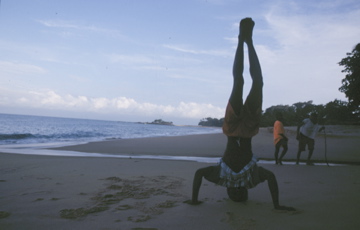Human Security and the Environment
Completion Date: Feb 28, 2007
- Canadian Consortium on Human Security
- Canadian Environmental Network International Program

Resources such as diamonds, oil, forests and water can be both drivers of conflict as well as agents of change that are impacted upon by conflict. Over twenty percent of modern conflicts are defined as “resource wars”. In addition to these overt conflicts, internal strife caused by drug wars, illicit trading in resources, and longer-term post- conflict effects on the environment, such as landmines, all present dilemmas for modern peacekeeping, peacemaking and conflict prevention. The recent UN millennium assessment report, “Human Well Being and the Environment” emphasizes some of these synergistic relationships. As civil society’s interest continues to grow in issues concerning “ecological governance”, conflict areas must adapt to and mitigate climate change, food, scarcity, fresh water depletion and land degradation. Increasing cross-border disputes over natural resources, access to energy and pollution point to the need to better understand these complex relationships.
Canada’s role in conflict prevention, peacekeeping and peacemaking is rapidly changing. While we become more involved in coalition-type combat roles, such as in Afghanistan, the world is becoming more prone to resource-driven conflicts. Direct connections can be made between the current conflict in Iraq and oil-related interests in the region. But notions of global security are also changing in a world that must confront global challenges as complex as climate change, ‘peak oil’ or the imminent demise of freshwater resources in cross-border regions.
The Project
The Human Security and the Environment Project was organized by One Sky, with support from the Canadian Consortium on Human Security (CCHS). The purpose of the project was to better understand and articulate Canadian civil society positions on human security and the environment. To that end, a one-day workshop/ policy dialogue on key issues facing the Canadian environmental NGO sector regarding human security and ecological governance was organized in February 2007 with participation from Canadian ENGO reps, academics, government and policy experts.
Policy Dialogue Workshop
The meeting enhanced the understanding among key academic and NGO representatives regarding the nexus between human security and the environment. It situated Canadian projects and conceptual approaches among four current schools of thinking and promoted three subsequent meetings including an additional forum sponsored by the International Institute on Sustainable Development. Some of the current work and thinking on the issue of human security and the environment is happening internationally among groups like the Global Environmental Change and Human Security Project which were presented at the meeting. Others, like One Sky and IISD, have NGO projects on human security and the environment but are not part of a national effort to address the subject. The meeting served as an opportunity to look at best practices and successful strategies as well as explore the emerging concepts of integral theory.
As many of the groups have public engagement projects or are involved in dialogue with Canadians the project assisted them in understanding the subject of human security and the environment.
Policy Recommendations
The meeting specifically looked at policy recommendations and a policy framework from which civil society can approach the broader issue of security using an ecological governance framework. Two key concepts were discussed, the use of holarchy in multi-scale approaches and how this relates to human well being and the environment (eg. Chapter 5 Millennium Assessment report) as well as Integral theory “quadrants”. Some specific premises were discussed including:
1) Traditional human security relies on an “us” and “them”. The environment is seen as a neutral, separated external resource over which we can have conflicts (that drive conflicts such as diamonds or oil) or that can be damaged by conflicts (collateral damage such as defoliants). Our understanding of holons, however, shows us that the biosphere is an embedded part of our consciousness and that we participate in social holons. “We” in our various identities as human social structures (Muslims, Canadians, Taliban) should try to identify and protect the well-being of the largest holon we can understand. Invariably this larger holon will embrace the largest number of perspectives possible. The key concept is that we must deal with the multi-scale dimensions of human security differently than traditional national security has entailed.
2) Each person is viewing the world from a perspective shaped by their personal development and is at a particular stage and that this can limit or expand how many perspectives we can hold. The same holds true for social groups who tend to have a “centre of gravity” that hovers around a particular stage of development. As we develop we can embrace more perspectives and evolve to higher stages. It also means that others are not so much “wrong” as less developed in their ability to hold perspectives. Security and sustainability depends on finding solutions that meet the developmental stage that a person, or society, is at. This may include curbing behaviours at lesser degrees of development to protect the greater whole.
3) If a social holon, no matter its centre of gravity, can at any given time, fall prey to an individual’s pathology then we must take steps to raise the centre of gravity of social holons so that these pathologies are easier to identify and isolate. While no one can force development we can provide the emergent ground upon which development is better able to take place. This is the role of social change agents and NGOs. We must become better able to recognize what is motivating a behaviour and consistently opt for solutions that benefit the most complex holon. In order to do that we need to develop leadership in all quadrants and all lines. This is why we should spend time encouraging individual development as well as organizational development, network development and the development of movements. Again the multi-scale dimensions of human security need multi-scaled solutions.

